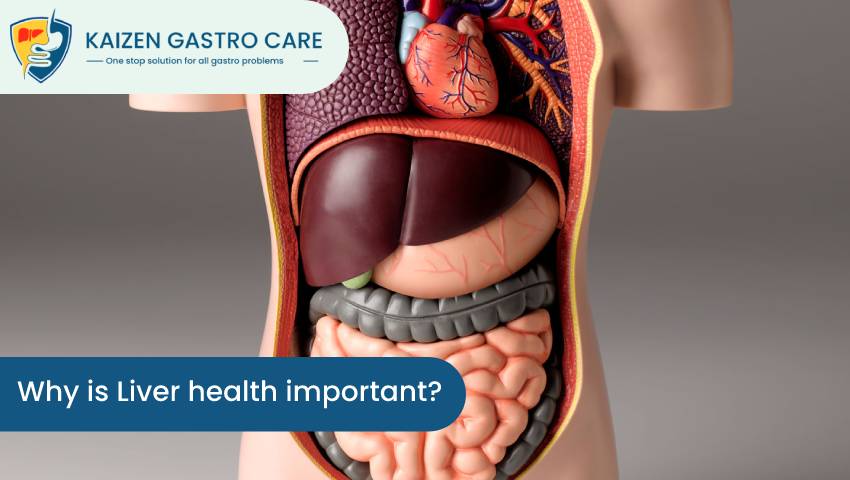
- 28/04/2023
- Kaizen Gastro Care
- 0 Comments
- Liver Disorder
Why is Liver health important?
The liver is one of the most important organs in the human body. It plays a vital role in many bodily functions, including digestion, metabolism, and detoxification. Despite its importance, liver health is often overlooked, and people tend to neglect their liver until it’s too late.
Maintaining good liver health is essential for overall well-being. Poor liver health can lead to a host of health problems, including liver damage, liver failure, and even liver cancer. Therefore, it’s essential to take care of your liver and make it a priority.
One way to promote good liver health is by visiting a specialist gastroenterology clinic like Kaizen Gastro Care. They specialize in the diagnosis and treatment of various liver and digestive system disorders. Their team of experienced doctors and specialists provides personalized care and treatment plans to meet each patient’s specific needs.
Now, let's explore some reasons why liver health is so important.
- Detoxification: One of the liver’s most important functions is detoxification. It removes harmful toxins and substances from the body and prevents them from accumulating in the bloodstream. When the liver is functioning correctly, it can filter out toxins from the blood and break them down into less harmful substances that can be excreted. However, when the liver is damaged, it may not be able to detoxify the body effectively, leading to a buildup of toxins in the bloodstream, which can cause damage to other organs.
- Metabolism: The liver plays a crucial role in metabolism. It is responsible for converting nutrients from the food we eat into energy that our bodies can use. The liver also stores nutrients, such as vitamins and minerals, and releases them into the bloodstream as needed. If the liver is not functioning correctly, it can lead to problems with metabolism, including insulin resistance, high blood sugar, and obesity.
- Digestion: The liver produces bile, a substance that helps digest fats in the small intestine. Bile is essential for the absorption of fat-soluble vitamins, such as A, D, E, and K. Without enough bile, these vitamins cannot be properly absorbed, leading to deficiencies. When the liver is not functioning correctly, it can lead to problems with digestion, including bloating, constipation, and diarrhea.
- Immune System: The liver plays a vital role in the immune system. It produces immune cells, such as lymphocytes, that help fight off infections and diseases. It also removes bacteria and other pathogens from the bloodstream. If the liver is not functioning correctly, it can lead to a weakened immune system, making the body more susceptible to infections and diseases.
- Storage: The liver stores essential nutrients, such as iron, copper, and vitamins A, D, and B12. It also stores glucose, which can be used as a source of energy when needed. When the liver is not functioning correctly, it can lead to problems with nutrient storage and regulation, leading to deficiencies or excesses.
Now that we understand why liver health is so important let's look at some tips for maintaining good liver health.
- Eat a Healthy Diet: A healthy diet is essential for liver health. Eat plenty of fruits and vegetables, whole grains, lean protein, and healthy fats. Avoid processed foods, sugary drinks, and excessive amounts of alcohol.
- Stay Hydrated: Drinking enough water is essential for liver health. It helps flush out toxins and keeps the liver functioning correctly.
- Exercise Regularly: Regular exercise can improve liver function and reduce the risk of fatty liver disease. Aim for at least 30 minutes of moderate-intensity exercise most days of the week.
- Limit Alcohol Consumption: Excessive alcohol consumption is one of the leading causes of liver disease. Limit your alcohol intake to one drink per day for women and two drinks per day for men.
- Manage Your Weight: Being overweight or obese can increase the risk of fatty liver disease. Manage your weight through a healthy diet and regular exercise.
- Avoid Exposure to Toxins: Avoid exposure to harmful toxins, such as chemicals, pesticides, and other environmental toxins, as much as possible.
- Get Vaccinated: Get vaccinated for hepatitis A and B to protect against these viral infections that can cause liver damage.
- Seek Medical Attention: If you are experiencing symptoms of liver disease, such as fatigue, jaundice, or abdominal pain, seek medical attention immediately. Early diagnosis and treatment can prevent further damage and improve outcomes.
Summary:
Liver health is crucial for overall well-being. A healthy liver can help detoxify the body, regulate metabolism, aid in digestion, support the immune system, and store essential nutrients. To maintain good liver health, eat a healthy diet, stay hydrated, exercise regularly, limit alcohol consumption, manage your weight, avoid exposure to toxins, get vaccinated, and seek medical attention if needed.
If you are experiencing liver or digestive system issues, consider visiting a specialist gastroenterology clinic like Kaizen Gastro Care. Their team of experienced doctors and specialists provides personalized care and treatment plans to meet each patient’s specific needs. By taking care of your liver, you can ensure a healthier and happier life.
